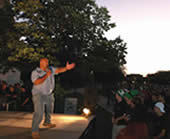
From his small, out-of-the-way office in the Joyce Center, Chris Zorich ’91, ’02J.D. serves as a confidant to athletes in need of a candid conversation.
It’s an entry-level position.
At least it is to Zorich, 39, who’s new to the complex business of college athletic administration but not to its potential entanglements.
He aspires to be an athletic director. That’s why he pursued the job as manager of the Notre Dame athletic department’s Student Welfare and Development program instead of continuing his more lucrative, but less rewarding, career as an attorney.
In the position he accepted in June, Zorich can gain administrative insight in a high-profile athletic department, while sharing his perspective with athletes navigating its pitfalls and opportunities.
Zorich has been there.
Through aching homesickness and academic probation as a Notre Dame freshman in 1987 to an All-American career as a defensive lineman, Zorich charted his own path without a map.
“When I was here,” he says, “there was no one in our athletic department like myself.”
No one to be a sounding board for the anxiety and disorientation of a kid from south Chicago who had trouble sleeping on campus because it was too quiet. As a frightened, undersized player who never earned an accolade bigger than all-state, Zorich could not admit those feelings to coaches and teammates whose stature dwarfed his in every way.
Now he is among the most decorated and respected among them, adding membership in the College Football Hall of Fame and the Knight Commission on Intercollegiate Athletics to his resume in recent months.
Back on campus, Zorich oversees the University’s summer sports camps, coordinating the scheduling, housing, food service and facilities, in addition to directing programs for the academic, social and spiritual development of Notre Dame’s 800 student-athletes. Those broad administrative responsibilities dovetail with his commitment to be a personal resource for individuals who need guidance through the pressures and insecurities he remembers well.
His office offers a place for athletes across the spectrum of sports to do what he never could—to vent their angst and anger, with the promise of empathy and discretion. “My mission, the reason our office was created, was to help you throughout your college career,” Zorich tells students. “Anything that’s said in this room, with the door closed, is going to be between you and me.”
His own journey to this office involved a detour from the high-speed path of personal and professional success he experienced since the day the Chicago Bears drafted him in 1991. He had spent months after his senior season mourning the unexpected death of his mother, Zora. Then the opportunity to play professional football in his hometown propelled Zorich into a blur of activity that did not slow down for more than a decade.
“Honestly, ever since that day, my life’s been kind of in fast-forward,” he says.
Zorich spent seven years in the NFL, then attended law school at Notre Dame, all the while running the Christopher Zorich Foundation, which offered mentoring, scholarships, food, clothing and toy donations among its array of charitable services. After earning his law degree in 2002, he worked in business enterprise and estate management for the Chicago firm of Schuyler Roche.
Divorce from his wife in 2005 stopped him cold. Like the scared college freshman forced to re-imagine his life on the foreign Notre Dame campus, Zorich reconsidered his priorities as a way to salve his emotional wounds.
“I was really going through a lot, I was depressed and I wanted to find a way out,” Zorich says. “One of the things I did was kind of reassess my life.”
The rigors and rewards of the legal profession did not inspire him. Twin passions eclipsed everything else—community service and college sports. “My goals have always included helping people,” Zorich says, “but I have this fascination for intercollegiate athletics.”
So how could he combine those things?
Exploratory conversations with administrators around the country led to months of discussions with then Notre Dame athletic director Kevin White, who helped Zorich find the right fit for his talents and aspirations. They came up with a wide range of responsibilities and one meaningful mission: To hold a flashlight to help athletes see beyond the field into their future.
Zorich never could have envisioned his future when he played football for Notre Dame. Now he’s an attorney, a College Football Hall of Fame enshrinee, and a voice of experience inside the athletic department about how to handle both accomplishment and adversity on the way from there to here.
Jason Kelly is assistant sports editor and columnist at the South Bend Tribune and the author of Mr. Notre Dame: The Life and Legend of Edward “Moose” Krause.
Photo of Chris Zorich at the Dillon Hall pep rally by Matt Cashore